The Grapevine Art & Soul Salon
Miscellany: A Gallery for Related Materials
AROUND THE WORLD ON THE GRAPEVINE
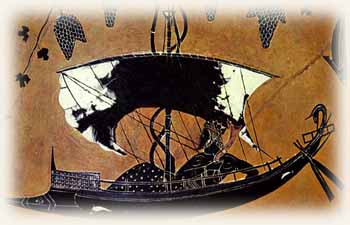
Travel is fatal to prejudice, bigotry, and narrow-mindedness, and many of our people need it sorely on these accounts. Broad, wholesome, charitable views of men and things cannot be acquired by vegetating in one little corner of the earth all one's lifetime.
Mark Twain, Innocents Abroad
THE YEAR 1972: Barbara Knott
In l972 I spent the summer in Switzerland, situated for the most part at Villa Negroni in Montagnola, near Hermann Hesse's grave and not far from Lago Maggiore where Eranos Conferences took place annually. The year's happenings included the following:
In February, Richard Nixon, President, made an unprecedented eight-day visit to Communist China and met with Mao Zedong. In June five men attempted to bug Democratic National Committee headquarters in Washington's Watergate complex and were apprehended, launching an investigation and the resulting Watergate scandal. In December Nixon ordered the Christmas bombing of North Vietnam.
U. S. population was a mere 209,896,021, nearly a hundred million less than today, a figure that was reduced by two in the deaths of J. Edgar Hoover and Harry S. Truman. George Wallace, Governor of Alabama, was shot at a political rally. The U. S. Supreme Court ruled that the death penalty is unconstitutional.
CAT scanning was developed in England, Prozac in Scotland, the compact disk in the U.S., the video disk in the Netherlands. Time Inc. transmitted HBO, the first pay cable network. The National Institute of Mental Health and the surgeon general issued a report claiming that "exposure to violence on television fosters aggression in children." Atari brought out the arcade version of Pong, the first video game. E-mail was introduced to the world. Apollo XVII returned to Earth with 250 pounds of lunar samples.
John Ashberry published Three Poems and Eudora Welty The Optimist's Daughter. A Pulitzer Prize went to Wallace Stegner for Angle of Repose.The Nobel Prize for Literature was awarded to Heinrich Boll of Germany. Nobels in chemistry, physics, and medicine were won by Americans.
Movies of the year included The Godfather, Deliverance, Cabaret, Sleuth. The Academy Award for the Best Picture went to Philip D'Antoni, producer of The French Connection.
Gloria Steinem's Ms magazine entered the market, and M*A*S*H premiered on television. Album of the Year was Carole King's Tapestry. She also won a Grammy for Best Song, "You've Got a Friend" and for Record of the Year, "It's Too Late."
Not much is mentioned at infoplease.com about foreign politics, except that Britain in March took over direct rule of Northern Ireland "in a bid for peace." And in September - well, that was the summer Olympic games were held in Germany and the year the world got one of its first hints of what we now call terrorism, a change that in two decades would dominate international news.
The Patterns of Global Terrorism report from the U. S. Department of State for 1992 begins this way:
Until recently, terrorism had receded from the attention of most Americans. Terrorism is now back in the headlines, and we see ominous signs that the problem will escalate, compounded by the resurgence of regional and ethnic conflicts around the world. Since the new year, we have had the bombing of the World Trade Center, the killing of two CIA employees outside CIA Headquarters, and several airplane hijackings. These incidents remind us of our vulnerability to violent attacks.
The subsequent decade made the month of September infamous for an act that was far more destructive in quantity of lives than the 1972 Olympics raid that resulted in the deaths of eleven athletes, though the suffering is, I suspect, of the same quality.
Germany had hosted the Games earlier in l936 when Hitler wanted to put on the playing fields what he thought would be evidence of Aryan superiority. His anticipated pleasure must have been diminished by the four gold medals awarded to U. S. runner Jesse Owens, son of a sharecropper and grandson of a slave. Ironically, when traveling in Europe, Owens was allowed to share lodgings with white athletes, something he could not do at home. Though treated coldly by Hitler, Owens said, on returning home to the U. S.,
When I came back to my native country, after all the stories about Hitler, I couldn't ride in the front of the bus. I had to go to the back door. I couldn't live where I wanted. I wasn't invited to shake hands with Hitler, but I wasn't invited to the White House to shake hands with the President, either.
In 1972 Germans must have hoped to heal the racial wounding inflicted by Hitler on his own people as well as on the world. Instead, Germany became the setting for another global outrage. Infoplease gives this account:
On the morning of September 5, with six days left in the Games, the worst tragedy in Olympic history hit. Eight Arab terrorists stormed into the Olympic village and raided the apartment building that housed the Israeli contingent. Two Israeli athletes were killed and nine more were seized as hostages. They demanded the release of over 200 Palestinians serving time in Israeli jails, along with two renowned German terrorists.>
After a day of unsuccessful negotiations, the terrorists collected the hostages and headed for the military airport in Munich for a flight back to the Middle East. At the airport, German sharpshooters opened fire, killing three of the Palestinians. A horrifying gun battle ensued, claiming the lives of all nine of the hostages, along with one policeman and two terrorists.
Now, a little more than three decades beyond 1972, global terrorism is so much a part of common life that when I read the morning news on Comcast, I find my eyes rushing down the page, past statistics of war dead, past the accounts of suicide bombers and cultural wreckage left by warlords and their weapon-wielding enforcers, past accounts of burnings and brutalizations here and abroad, in search of something heartening. And what do I find?
TomKat's marriage and Madonna's adoption and Brangelina's latest interventions in world history rank right up there with what the Pope said to the Archbishop of Canterbury or what he should not have said about Islam or with the bombast of Kim Jong II and Mahmoud Ahmadinejad.
And so I return to the personal, to the solitude of my own thoughts ranging over the thirty-year period in which I have experienced much of what I know of the world.
1972 was the year my son was conceived. He is now the same age I was then, and I am, of course, twice as old as he is and as the person I then was. It was the year I first went abroad, the year I met David Miller. Synchronicity abounds. It was also the year Ravi Kumar first traveled to the United States where he would move thirty years later and become a member of this salon. He is presently the host of a new salon column, WorldVoices, where we hope to hear interesting harmonies.
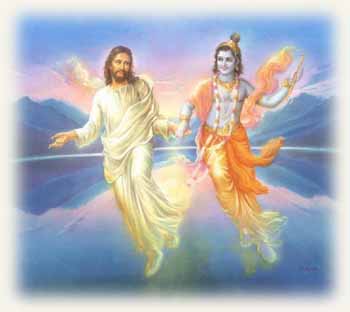
...from www.gita.society.com
Eranos Conferences
at Lake Maggiore, Ascona, Switzerland, attracted intellectuals from East and West to a feast of thoughtful presentations that spoke of potentials for harmony in the world.
For more information, click on Presentations and go to Barbara Knott's review of Disturbances in the Field: Essays in Honor of David L. Miller"


Quotation without comment....
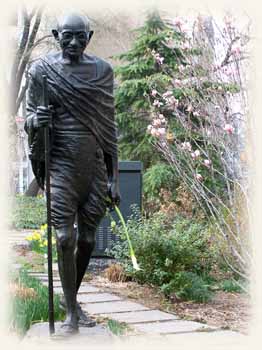
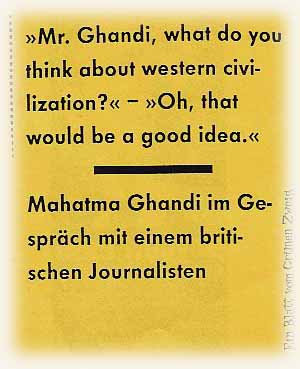
...the horror, the horror....
Jonathan Knott's interview with Mr. Grabia (see WorldVoices) reflects on the marvel of the human ability to endure. Here is a another Holocaust story:
Some hours later they were liberated by the American Army near the town of Dachau. The American commander forced the local townspeople to come and see what the glorious Third Reich had done to humanity. An elderly woman stared at Livia with great compassion. Finally she said to her, "It must have been very difficult for people your age to endure all this suffering."
"How old do you think I am?" Livia asked her.
"Maybe sixty, maybe sixty-two," replied the German woman.
"Fourteen," replied Livia.
The German woman crossed herself in horror and fled.
From Yaffa Eliach, Hasidic Tales of the Holocaust (New York: Oxford UP, l982), via Doug Thorpe, "Crossing the Threshold," Parabola: The Stranger, Summer 1995, 86.
Paintings by Dorothy Brett

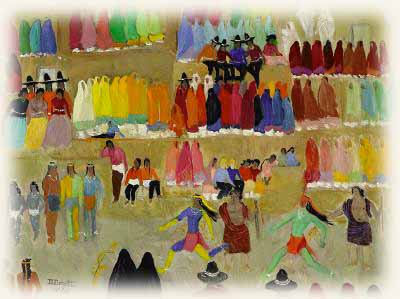
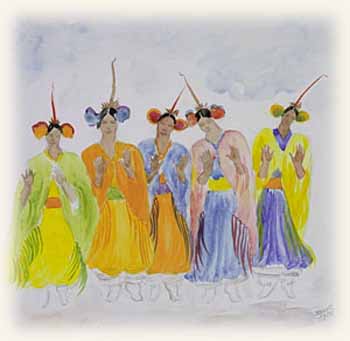
Barbara Knott's "On Becoming Human" (see Presentations) refers to her acquaintance with Dorothy Brett who made the paintings depicted above of the Taos Pueblo Indians.
Jung and Ochwiay Biano (Mountain Lake)
When C. G. Jung visited the Taos Pueblo at the age of 50 in 1925 (within a year, synchronistically, of the time Dorothy Brett arrived at Taos with D. H. Lawrence and his wife Frieda), he experienced for the first time a glimpse of how white people were perceived by people they were in the habit of colonizing. Here is the passage from his Memories, Dreams, Reflections (1961), 247-53:
On my next trip to the United States I went with a group of American friends to visit the Indians of New Mexico, the city-building Pueblos.... There for the first time I had the good fortune to talk with a non- European, that is, to a non-white. He was a chief of Taos pueblos, an intelligent man between the ages of forty and fifty. His name was Ochwiay Biano (Mountain Lake). I was able to talk with him as I have rarely been able to talk with a European. To be sure, he was caught up in his world just as much as a European is in his, but what a world it was! In talk with a European, one is constantly running up on the sand bars of things long known but never understood; with this Indian, the vessel floated freely on deep, alien seas...
"See," Ochwiay Biano said, "how cruel the whites look. Their lips are thin, their noses sharp, their faces furrowed and distorted by folds. Their eyes have a staring expression; they are always seeking something. What are they seeking? The whites always want something; they are always uneasy and restless. We do not know what they want. We do not understand them. We think that they are mad."
I asked him why he thought the whites were all mad.
"They say that they think with their heads," he replied.
"Why of course. What do you think with?" I asked him in surprise.
"We think here," he said, indicating his heart.
I fell into a long meditation. For the first time in my life, so it seemed to me, someone had drawn for me a picture of the real white man. It was as though until now I had seen nothing but sentimental, prettified color prints. This Indian had struck our vulnerable spot, unveiled a truth to which we are blind. I felt rising within me like a shapeless mist something unknown and yet deeply familiar. And out of this mist, image upon image detached itself: first Roman legions smashing into the cities of Gaul, and the keenly incised features of Julius Caesar, Scipio Africanus, and Pompey. I saw the Roman eagle on the North Sea and on the banks of the White Nile. Then I saw St. Augustine transmitting the Christian creed to the Britons on the tips of Roman lances, and Charlemagne's most glorious forced conversions of the heathen; then the pillaging and murdering bands of the Crusading armies. With a secret stab I realized the hollowness of that old romanticism about the Crusades. Then followed Columbus, Cortes, and the other conquistadors who with fire, sword, torture, and Christianity came down upon even these remote pueblos dreaming peacefully in the Sun, their Father. I saw, too, the peoples of the Pacific islands decimated by firewater, syphilis, and scarlet fever carried in the clothes the missionaries forced on them.
It was enough. What we from our point of view call colonization, missions to the heathen, spread of civilization, etc., has another face -- the face of a bird of prey seeking with cruel intentness for distant quarry -- a face worthy of a race of pirates and highwaymen. All the eagles and other predatory creatures that adorn our coats of arms seem to me apt psychological representatives of our true nature.
When Charles and I visited Taos in 1966, Mountain Lake was probably in his eighties, courteous and hospitable to these whites who had obtained permission to attend the San Geronimo Festival and who had been led to his niche in the pueblo by another member of the tribe, who appeared like a dream figure and asked if he could help us discover where we were going. The old chief's room was bare except for a bunk bed and one picture on the wall, of Abraham Lincoln. He spoke quietly of his early trips to Washington, his negotiations with the government (the Pueblos were singularly fortunate to have won the right to keep their sacred mountain in their own possession) and his misgivings about the generation of youth among his tribe who, he suggested, were less interested in their rights and tribal values than his generation had been. BK
Lumbee Tribe of North Carolina
See lumbee.org for information about this tribe of Native Americans with mysterious origins, mentioned in Jonathan Knott's review of A Cry of Angels by Jeff Fields. Here is an excerpt from the website:
Our presence has been documented by historical accounts and oral traditions. We have continued to exist as a tribe despite conditions that threatened to destroy the fabric of our Indian community.
The Lumbee culture is constantly evolving, yet our traditions are still holding firm. The southeastern culture deals ... with agriculture, family, and hunting and gathering. In those aspects, we are not very different than we were a century ago.
The Lumbee culture has ties to hard work and perseverance. A community of talented construction workers, educators, and artists of all mediums, we work creating homes, families, and communities to be proud of.
At the time Jeff Fields' novel was written, there was no website, of course. Keeping in mind that the Lumbees have had considerable difficulty with the federal government about identity and rights, isn't it interesting that the culture of the tribe, as they see it and express it in the last paragraph above, has evolved along the lines of the values revealed in the novel? BK

This Cherokee story was sent around on the Internet:
An elder Cherokee Native American was teaching his grandchildren about life. He said to them, "A fight is going on inside me...It is a terrible fight, and it is between two wolves. One wolf represents fear, anger, envy, sorrow, regret, greed, arrogance, self-pity, guilt, resentment, inferiority, lies, pride and superiority. The other wolf stands for joy, peace, love, hope, sharing, serenity, humility, kindness, benevolence, friendship, empathy, generosity, truth, compassion, and faith. This same fight is going on inside of you and every other person too." They thought about it for a minute and then one child asked his grandfather, "Which wolf will win?" The old Cherokee simply replied..."The one I feed."
Booksigning at Palmetto with Jeff Fields
Sunday, October 29, 2006
Jeff Fields visited the Palmetto Place where he read from and signed copies of A Cry of Angels. Here are photographs from the event:







